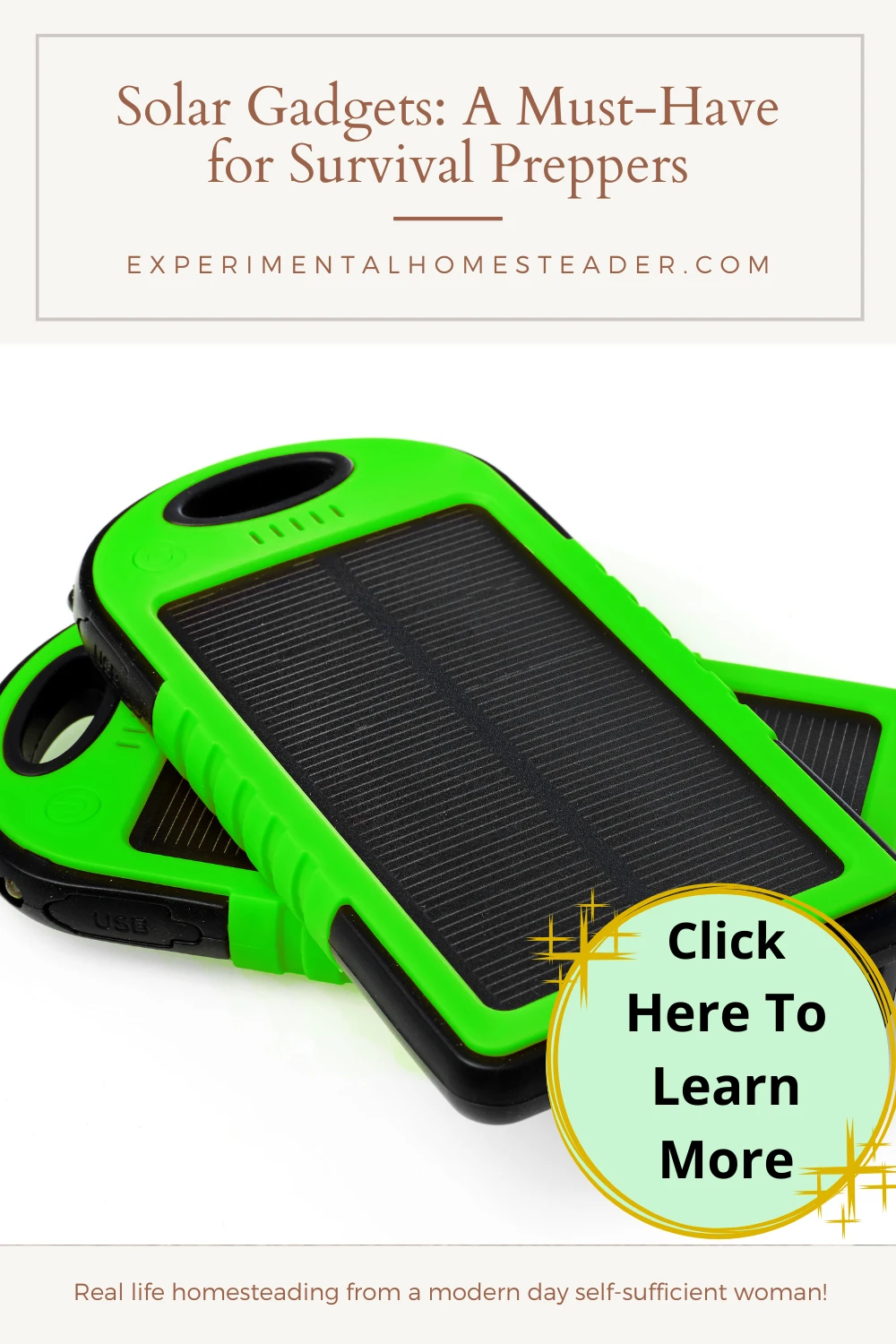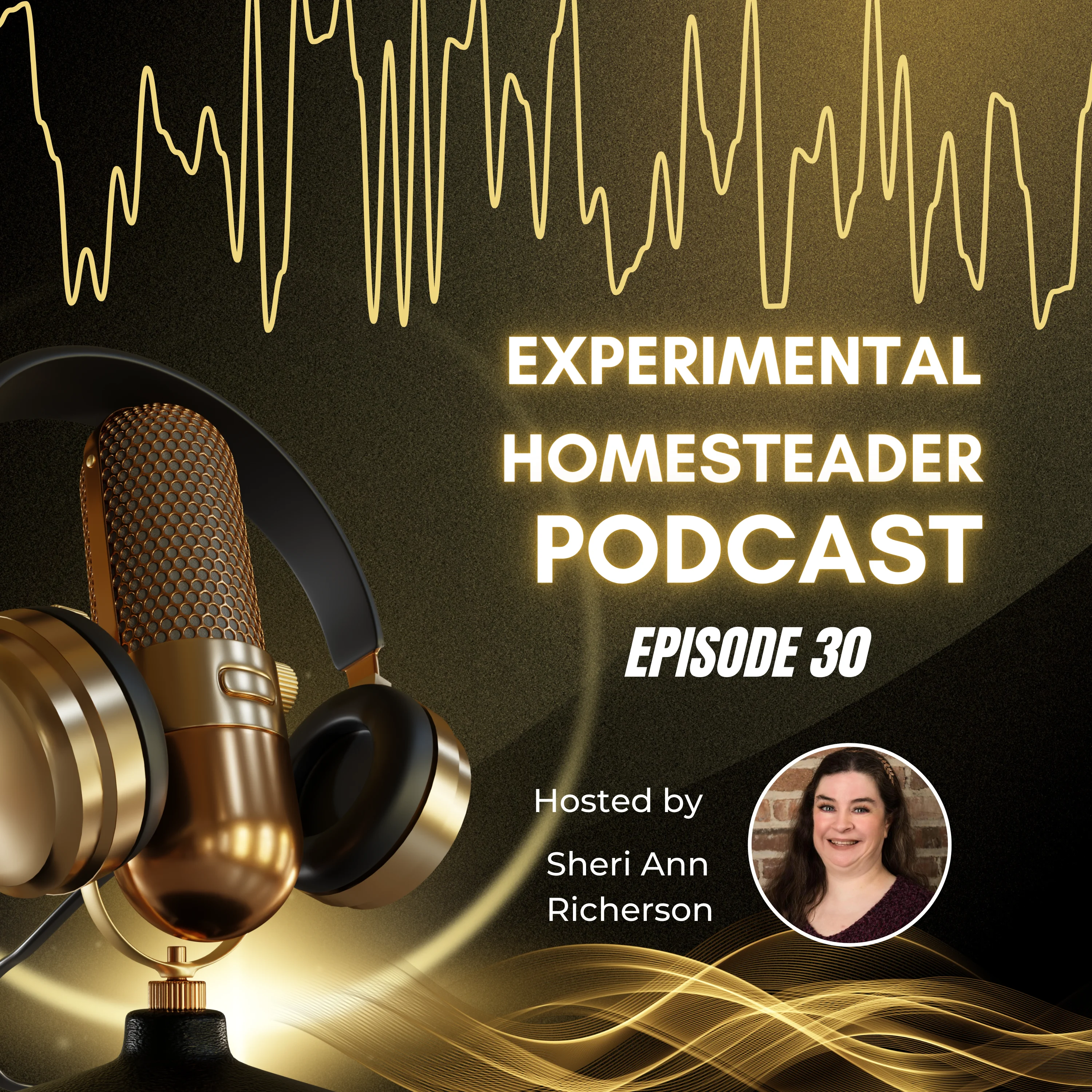
Welcome to today's podcast episode, Solar Gadgets: A Must-Have for Survival Preppers.
In today's episode, we're diving into task number 18 of the 50 survival prepper tasks for beginners, although as Sheri Ann Richerson from ExperimentalHomesteader.com points out, these tasks are valuable for anyone interested in survival prepping.
Task number 18 encourages us to explore the world of solar survival gadgets and start saving up for one.
Sheri shares her insights into the diverse range of solar gadgets available, from solar cookers to solar generators, phone chargers, lights, and more.
She highlights the benefits of these gadgets, emphasizing their independence from electricity and batteries once purchased.
Sheri's firsthand experience with DIY solar projects, like her homemade solar cooker, adds a personal touch to the discussion.
As she concludes, Sheri encourages viewer engagement and feedback, reminding us that community support and shared knowledge are essential in the journey toward self-reliance.
So, whether you're a seasoned survivalist or just beginning your prepping journey, join us as we explore the world of solar gadgets and their role in preparedness.
📍 Hey guys, Sheri Ann Richerson from ExperimentalHomesteader. com and welcome to our daily vlog. Today, we're going to talk about task number 18 in the 50 survival prepper tasks for beginners that I have been talking with you guys about. As I say every time, I hate the fact that these are quote unquote tasks for beginners because they're really not.
📍 They're for anybody. That is survival prepping and has not done this yet. So, let's begin. Task number 18 is to look at the solar survival gadgets available and save up for one. There are a lot of these, and let's face it, a lot of us would just like to be off grid. But that is pretty pricey. And off grid is not, what I would say, as simple as...
📍 One might think you can save up and get the solar panels put on your house, but that doesn't mean you can necessarily cut the ties to the electrical grid. Some places won't allow that. You have to work with the electric company like we do here to use the right company, make sure that everything is done right, get their approval, and then you still have to be tied to the grid.
📍 But these are gadgets. So there are many solar gadgets for survival that you might want to consider investing in. Some you might even be able to make yourself, such as a solar cooker. They have ready made ones, too. And we do have a DIY solar cooker post on experimentalhomesteader. com. It is made out of aluminum foil and a cardboard box, some perlite.
📍 And of course a piece of glass for the top so and it does actually work. I made it many, many years ago before I had the fancy new one that I received for review and we did use it to make some different food. So you can also find solar powered generators, which I think would be really cool. Solar phone chargers, I have some of those, they do work, solar lights, I have some of those, and more.
📍 These may cost a little more up front, but you won't need electricity or batteries to use them from this point on, so they do pay for themselves in the long run. And I have a small solar panel that can unfold, that really is very nice again it is an item that I received for free for review. And I have used it numerous times.
📍 I do have to tell you, it does better if you put it outside on a sunny day than if you try to use it. Up against a window. I have tried both just to see if the light coming through the window was enough. I'm thinking if there was some reason I didn't wanna be outside or I didn't want the solar panel outside because the one I have, it doesn't actually store the electricity, so you have to have your device plugged into it while it is charging, and I don't wanna say that it won't charge.
📍 I, from inside of a window, I will say that outside it charges a lot faster. It does a lot better, probably because it's collecting more of the sun's rays. I have seen a long time ago, and I don't know if you can still buy this issue or look it up. I'm not sure what issue it actually was but I bought an issue of Mother Earth News.
📍 And on the front cover of the magazine were these homemade solar panels that cost less than a hundred dollars to make. Now obviously the prices of everything has gone up and so these are going to cost more than a hundred dollars today. Unless you can find the materials second hand or you have the materials on hand.
📍 But anyway, They had made these solar panels that were used for heat and the author of the article said that the solar panels which were just made with the plastic corrugated material that they use on greenhouses he said that it raised the interior temperature of his building like 30 degrees.
📍 Even in the wintertime, so that's something that I've always been interested in doing, something that put a damper on my idea of trying this was they sell these corrugated plastic panels at Lowe's. And we bought some for the roof of my greenhouse and the first hailstorm, it literally destroyed those panels and that was how I lost all my plants.
📍 So, I was told that possibly if I would have put very small, like quarter inch hardware cloth. About 6 inches away from those panels, they might have lasted longer. They do make corrugated panels like that that are for greenhouses that do come with a 10 year warranty. So if you're going to do something like that, invest in the good stuff.
📍 Don't just go to Lowe's and get the cheapest thing you can find off the shelf. Because it may not hold up and it may be money invested that is just wasted just like what we did with my greenhouse. So, but I think, you know, doing that 30 degrees, I don't know what difference that would make. I know in the main part of our house, which we can keep a 50 degrees with just the wood burner, that would bring the main part of the house up to 80 degrees, which would be more than toasty in the wintertime.
📍 And we wouldn't need any. Electric baseboard heating, which is what we have to raise the temperature up. So, again, something that I'm definitely interested in as far as the little tiny solar chargers for phones. The ones that, and I received this for review again, the one I have, it has kind of like a big clip on it, and so you could clip it to your purse handle, your backpack, your belt loop on your pants.
📍 Really anything that you had that because I mean the opening is about like that so it's it's a good size opening That would clip around something So a backpack strap, it would be easy to clip around that and I have used that I have set those in my car windows When I've been sitting someplace waiting on somebody and needed to charge my phone and that seems to do, okay It's not fast, you know, by, by no means is it fast, but it is definitely an option.
📍 And the solar gadgets are something you're going to want to look for if you really are thinking about going off grid. Because then instead of picking and choosing, you may be able to get some smaller solar gadgets. That are going to charge things like laptops and phones and things, and you're not going to have to use the big solar panels on your house and take away from your stove or your refrigerator, your freezer, or you know, whatever it is that you otherwise might have to unplug long enough to use the solar power to use It charges your devices.
📍 So, these come in all different price ranges. I don't necessarily think you need something really expensive. I don't think any of the gadgets I have were super, super expensive. I think you need to look at them and read the reviews and make a really informed decision when you do this. I know there, like I said, there are lots and lots of DIY books that tell you how to make solar panels.
📍 We've never done this, so I can't tell you how easy or how hard it is. Like I said, the closest thing I've even thought about was those heater panels, which really appealed to me. But of course, since they mount on your house, on the walls of your house, you have to have some kind of opening to let that heat in and then of course some way to close them off because there would be no need of leaving the opening exposed at night because you're not going to get any heat in overnight.
📍 So you'd want to close that off. So your heat can't go out through the hole and you're not bringing a bunch of cold air in. But, like I said, these would also make great gifts for the survivalist prepper or homesteader in your life. Another thing to think about. And, I guess that's kind of it. Oh, solar generators.
📍 Okay. So one of the issues with generators is, you may have to find fuel. Or use electricity. And if you don't have fuel, and you don't have electricity, that generator is not going to do you a bit of good. Now, if you're going to get a solar generator, that again is something you really want to look into and consider the wattage of the generator.
📍 I have seen some really nice ones that are on wheels that look like, you know, they've got the solar panels that you can set out and set up and hook to the generator and it looks like a really nice setup that actually would power a house, at least, you know, the important things like your refrigerator, your freezer, some lights.
📍 So. If you're going to do something like that, you need to take the time again, do your research. That's 99 percent of all this is doing your research and buying the best product that you can buy with the money that you have available to buy it with. So I hope that's helpful guys. Please subscribe, thumbs up, thumbs down, comments below.
📍 Thanks for watching and have a great night.
Be sure to look for the Experimental Homesteader Podcast on Apple Podcasts and also Amazon Music - and be sure to follow so you don't miss an episode!






